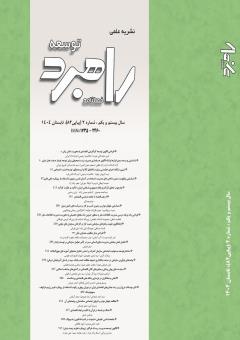ساختارتوسعه مسئولیت اجتماعی سازمان گمرک بر اساس تحلیل محتوای آموزه¬های نهج البلاغه
محورهای موضوعی : Culturalسیامک آذری 1 , نیما رنجی جفرودی 2 , علیرضا فرخ بخت فومنی 3
1 - دانشجوی دکتری گروه مدیریت، واحد آستارا، دانشگاه آزاد اسلامی، آستارا، ایران.
2 - استادیار گروه مدیریت ، واحد بندرانزلی ، دانشگاه آزاد اسلامی، بندرانزلی ،ایران.
3 - گروه مدیریت، واحدانزلی، دانشگاه آزاد اسلامی، انزلی ایران.
کلید واژه: توسعه مسئولیت اجتماعی, سازمان گمرک, نهج البلاغه. ,
چکیده مقاله :
انسان از دیدگاه امام علی (ع) موجودی اجتماعی است که حضور وی در اجتماع ضرورت توسعه وظایف اجتماعی و سیاسی را ایجاب میکند تا بتواند نقش مؤثری در جامعه ایفا نماید. بر این اساس، هدف پژوهش حاضر، مطالعه ساختار توسعه مسئولیت اجتماعی سازمان گمرک با تحلیل محتوای آموزههای نهج البلاغه میباشد. این پژوهش با توجه به ماهیت موضوع از نوع تحلیل محتوای کمی است که رویکردی مناسب برای فهم محتوای متون و استخراج مفاهیم کلیدی محسوب میشود. جامعه آماری تحقیق شامل کتاب نهج البلاغه و نمونه آماری شامل کلیه خطبهها و مطالب مرتبط با توسعه مسئولیت اجتماعی است. ابزار گردآوری اطلاعات، فیشهای تخصصی تحلیل محتوا بوده و دادههای مرتبط با موضوع پژوهش از کتاب نهج البلاغه استخراج شدهاند. برای تحلیل دادهها، دستورالعمل کدگذاری بر اساس اهداف و موضوع تحقیق طراحی و اجرا گردید. نتایج پژوهش نشان داد که پنج مؤلفه اصلی مسئولیت اجتماعی، شامل بُعد اخلاقی، بُعد آموزش و یادگیری، بُعد رهبری و مدیریت، بُعد اقتصادی، و بُعد حقوقی از میان صدها مؤلفه فرعی استخراج شدهاند. توجه به این مؤلفهها و اجرای مؤثر آنها میتواند نقش مهمی در ارتقای کیفی توسعه مسئولیت اجتماعی افراد در سازمان ایفا نماید. یافتههای این پژوهش میتواند به بهبود عملکرد سازمان گمرک و افزایش مسئولیتپذیری اجتماعی کارکنان و مدیران آن کمک کند و زمینهساز ارتقای تعاملات اجتماعی در سازمان شود.
From the perspective of Imam Ali (AS), humans are inherently social beings whose presence in society necessitates the development of social and political responsibilities to effectively contribute to the community. Based on this premise, the present study aims to explore the structure of developing social responsibility within the customs organization through a content analysis of the teachings in Nahj al-Balagha. Given the nature of the subject, this research is categorized as a quantitative content analysis, which is an appropriate approach for understanding the content of texts and extracting key concepts. The statistical population of the study includes the entire Nahj al-Balagha, with the sample comprising all sermons and teachings related to the development of social responsibility. Data collection was conducted using specialized content analysis sheets, and relevant content was extracted from Nahj al-Balagha. To analyze the data, a coding guideline was designed and implemented based on the objectives and focus of the research. The findings revealed five main components of social responsibility, including the ethical dimension, the educational and learning dimension, the leadership and management dimension, the economic dimension, and the legal dimension, which were identified from hundreds of sub-components. Attention to and effective implementation of these components can play a significant role in improving the quality of social responsibility development among individuals in the organization. The results of this study can contribute to enhancing the performance of the customs organization, increasing the social responsibility of its employees and managers, and fostering improved social interactions within the organization.
